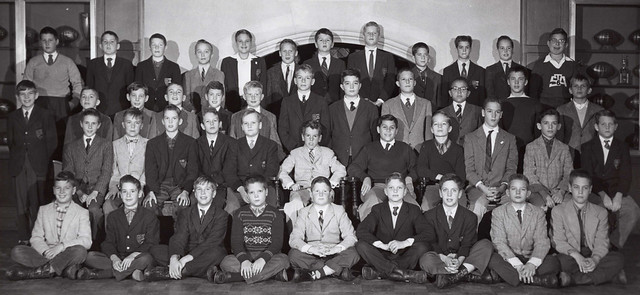STA News
Remembering a Major Moment in School History
The Class of 1964 honors a classmate, the first African American student at STA, with the establishment of The Frank Snowden Trust.
This summer, as Americans wrestled, amidst a pandemic, with racism past and present, a number of members of the Class of 1964 came together to begin raising funds to support a new endowed fund, The Frank Snowden Trust, in honor of a classmate. Snowden, the Andrew Downey Orrick Professor Emeritus of History and History of Medicine at Yale University, when asked, recommended that the fund support the study—through coursework and visiting speakers—of the history of slavery and its legacy.
As author of Epidemics and Society: From the Black Death to the Present (published by Yale University Press in October 2019), Snowden has been featured widely in the news this year. In the introduction to his book, he writes: “Epidemic diseases are not random events that afflict societies capriciously and without warning. On the contrary, every society produces its own specific vulnerabilities. To study them is to understand that society’s structure, its standard of living, and its political priorities.” In an interview with the New Yorker, Snowden explained: “Epidemics are a category of disease that seem to hold up the mirror to human beings as to who we really are … The main part of preparedness to face these events is that we need as human beings to realize that we’re all in this together, that what affects one person anywhere affects everyone everywhere, that we are therefore inevitably part of a species, and we need to think in that way rather than about divisions of race and ethnicity, economic status, and all the rest of it.”
At an alumni gathering last spring, Snowden encouraged a somewhat optimistic approach to the pandemic: “I don’t think this is a time of gloom and doom and despair, but rather of creative thinking and optimism to make a world that’s less vulnerable. We’re in this because we’ve made many, many mistakes as a society. And so I think this is a wonderful moment for reflection and for thinking about what we can do to make our world more sustainable and less vulnerable to these events. That’s an educational question that could be wonderful for the students to be engaged in as well.”

Frank Snowden ’64 (third row, third from right) and his Form A class in 1957.
The impetus for the new fund arises both from Snowden’s work as an educator who strives to unite, and also from his role and experiences as a member of the Class of 1964 at St. Albans: In 1957, at age eleven, Snowden entered Form A as the first Black student to integrate our school and as one of the first few pioneering students to integrate any area private school.
According to Snowden, his parents—a high school art teacher and a Howard University professor—had “resolved to do their utmost to provide the best available schooling for their children. They also wanted to support the larger cause of overturning segregation in education. St. Albans, which had a fine academic program but had just begun to confront the legacy of Jim Crow, seemed to them to offer an excellent opportunity to further both purposes.” The burden was significant for the eleven year old: “To guarantee my motivation, my parents and the school authorities solemnly informed me that I was to be a social experiment. Only if I did well would St. Albans ever admit another black boy,” Snowden wrote in the Bulletin in 2003.
Academically and athletically, Snowden thrived; his senior year, he was named a Presidential Scholar by President Lyndon Johnson in the first year of that program, and he served as captain of an IAC-winning track team. He also set a school record for the half-mile that stood for more than twenty years.
 |  |
In his senior year, below, Frank Snowden ’64 was named a Presidential Scholar by President Lyndon Johnson in the first year of that program.
Socially, he was greeted by the “full spectrum of views on the issue of race,” recalled Snowden, “including a vocal and active minority of perhaps ten students who had learned racist attitudes in their home and were committed to making my life sufficiently miserable that I would withdraw so that the old regime could be restored.” Lower School students greeted Snowden with racist slurs, challenges to fight, and anonymous notes suggesting he return to Africa. Invitations to select off-campus class parties went to all but him. In Upper School, the number of racist incidents began to diminish, but whenever his team or club traveled to compete at all-white area schools, he was left behind, feeling betrayed.
Explaining why he wants the new fund to support the study of slavery and its aftermath, Snowden said: “This would be of direct benefit to everyone at St. Albans by broadening the school’s curriculum in order to make certain that adequate attention is always given to understanding and explaining the ‘peculiar institution’ that lies at the heart of American history, and to making students aware of the many ways in which its legacy persists down to our own day.”
Members of the Class of 1964 have already begun raising funds and hope alumni from all classes will join them in their effort to build the Frank Snowden Trust. In a letter to his classmates, Snowden asked them not to think of it as dedicated to him personally, but symbolically, “as a marker of a major moment in the school’s history—the moment when it made a moral choice to break the era of segregation and to move forward in a committed way to rectify past injustices.” May Professor Snowden, and the Frank Snowden Trust, continue to symbolize and spur change and a renewed commitment at St. Albans to rectifying injustice.
Thanks to the following members of the Class of 1964 for spearheading this ongoing fundraising project: Bo Jones, Ken Morse, Mike Royce, Dan Amory, Tom Loftus, and Lars Peterson!
Located in Washington D.C., St. Albans School is a private, all boys day and boarding school. For more than a century, St. Albans has offered a distinctive educational experience for young men in grades 4 through 12. While our students reach exceptional academic goals and exhibit first-rate athletic and artistic achievements, as an Episcopal school we place equal emphasis upon moral and spiritual education.



